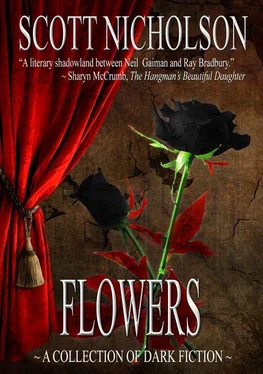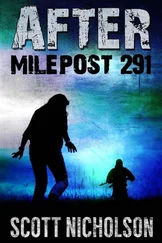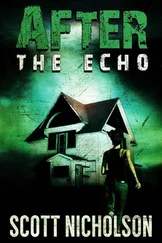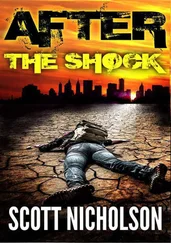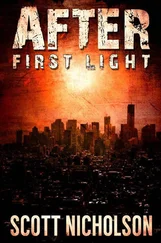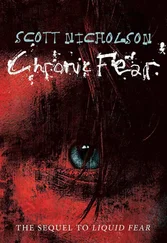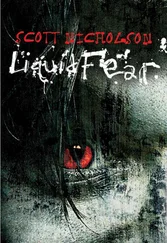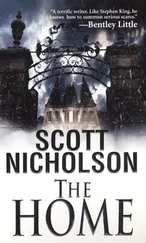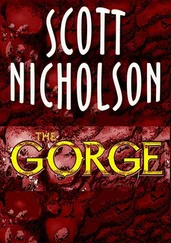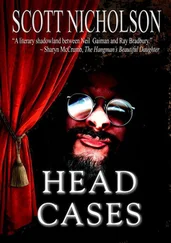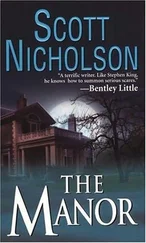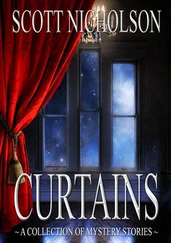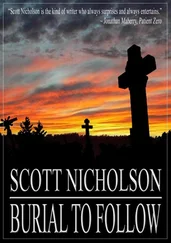Scott Nicholson - Ashes
Здесь есть возможность читать онлайн «Scott Nicholson - Ashes» весь текст электронной книги совершенно бесплатно (целиком полную версию без сокращений). В некоторых случаях можно слушать аудио, скачать через торрент в формате fb2 и присутствует краткое содержание. Жанр: Триллер, на английском языке. Описание произведения, (предисловие) а так же отзывы посетителей доступны на портале библиотеки ЛибКат.
- Название:Ashes
- Автор:
- Жанр:
- Год:неизвестен
- ISBN:нет данных
- Рейтинг книги:3 / 5. Голосов: 1
-
Избранное:Добавить в избранное
- Отзывы:
-
Ваша оценка:
- 60
- 1
- 2
- 3
- 4
- 5
Ashes: краткое содержание, описание и аннотация
Предлагаем к чтению аннотацию, описание, краткое содержание или предисловие (зависит от того, что написал сам автор книги «Ashes»). Если вы не нашли необходимую информацию о книге — напишите в комментариях, мы постараемся отыскать её.
Ashes — читать онлайн бесплатно полную книгу (весь текст) целиком
Ниже представлен текст книги, разбитый по страницам. Система сохранения места последней прочитанной страницы, позволяет с удобством читать онлайн бесплатно книгу «Ashes», без необходимости каждый раз заново искать на чём Вы остановились. Поставьте закладку, и сможете в любой момент перейти на страницу, на которой закончили чтение.
Интервал:
Закладка:
The nearest two shooters touched the tips of their bayonets to the assigned victims. The boy’s cap was blown off as the bullet demolished his skull. The old woman’s shot wasn’t immediately fatal, and she flopped on the ground for a moment as if suffering a severe electrical shock.
“ Inefficient,” Wolfram said, though he kept his own Luger holstered. A stream of guttural Hebrew spilled from her throat, a demonic, animal howl. Finally she lay still.
Scherr came along with the next group of Jews. He had apparently assigned himself to guard duty rather than participate in further shooting. His hands shook and his eyes were wide and bloodshot.
“ How many more in the village square?” Wolfram asked
“ Fewer than fifty,” Scherr said.
“ We’ll be done before dark. Hermannsbiel will be pleased.”
“ Good,” Scherr said. “I don’t want to be here at night.”
“ The night is an ally,” Wolfram said. “In the darkness, all things are hidden.”
Scherr gave an uneasy glance into the growing gloom, then trotted back to the village. Wolfram paced the trail, encouraging the men, reminding them of the rations waiting back at the barracks after their duty was finished. The priest had plenty more to drink, he told them.
By now, nearly the full length of the trail was lined with dead Jews. The bodies were no longer bodies; they were merely dark shapes on the shadowy forest floor. Occasionally one of the shapes would moan and lift a limb, but among the trees, who could tell flesh from wood?
Once the marketplace was empty and the Jewish quarters were quiet, a few Poles ventured into the streets. Wolfram appointed a detail to stand guard in case any stray Jews had been hiding and attempted to flee in the night, then ordered the rest of the platoon back to the station. He took a final walk along the twilit forest trail. He needed to own this memory, though he knew the reservists would speak little of it. A day’s work well done.
He came upon a figure standing on the trail, a darker silhouette against the sunset-dappled forest. It was a boy wearing a small Dutch cap.
“ Juden?” Wolfram asked.
“ Ja,” the boy said, and for a moment, the voice sounded like his son Karl’s, who was probably now asleep, nestled against his mother’s nightgown in a soft bed back in Hamburg.
Wolfram fumbled for his Luger, swallowing, the air thick with the wet-fur smell of blood and loam. Hermannsbiel had been quite clear. No survivors.
He drew the pistol, though it was heavy in his hand. A leader should never ask his men to do what he was unwilling to do himself.
He pointed the Luger at the boy, who still hadn’t moved.
If only the boy would run, Wolfram could finish it.
But the boy didn’t run. Instead, he moved toward Wolfram, feet making no sound in the leaves. Wolfram stood aside as the boy passed, accompanied by a cool breeze from the wind that rattled dead leaves. A last stray beam of sunlight pierced the canopy and shone on the boy’s cap, revealing a single bullet hole in the wool.
Wolfram holstered his weapon as the boy merged with the gathering darkness.
Later, at the barracks, he availed himself of the priest’s cognac. He sat down at a small table and in the midnight glow of a candle, he filed his full report for the day:
July 12, 1942. Jozefow, Poland
Third Company, Reserve Police Battalion 101, was given cold rations of sausage, bread, marmalade, and butter. In the future, please note that cold rations do not hold up well in the summer heat. Jewish resettlement actions continued. No special incidents occurred.
Wolfram lit a Turkish cigarette and watched the smoke rise from the glowing red tip toward the flickering ceiling of the barracks, then out into the deepest and blackest places of the world.
WORK IN PROGRESS
The cutting was the most demanding.
During his career as an artist, John Manning had sliced glass, trimmed paper, chipped granite, chiseled wood, shaved ice, and torched steel. Those materials were nothing compared to flesh. Flesh didn't always behave beneath the tool.
And bone might has well have been marble, for all its delicacy and stubbornness. Bone refused shaping. Bone wanted to splinter and curl, no matter how light John's touch on the hammer.
How did you build yourself alive?
Bit by bit.
Karen on the wall was a testament to that. Because Karen never lied.
And was never finished, an endless work in progress.
So building himself had become a mission from God. John knew from his time at college that art required suffering. He'd suffered plenty, from no job to canceled grants to broken fingers to Karen's last letter. His art had not improved, though he'd faithfully moved among the various media until his studio was as cluttered as a crow's nest.
He crushed out his cigarette and studied the portrait. Much of it had been done from memory. The painting had grown so large and oppressive in his mind that it assumed capital letters and became The Painting.
When he'd started it three years ago, the memory had flesh and was in the same room with him. Now he had to stagger through the caves of his brain to find her and demand she undress and model. And she had been so elusive lately.
Karen.
Her letter lay in a slot of his sorting shelf, just above a cluster of glass grapes. The paper had gone yellow, and rock dust was thick across its surface. If he opened the letter and read it, maybe she would come out of the smoky caves inside his skull. Except then he'd have to finish The Painting.
Looking out the window was easier, and had a shorter clean-up period. Painting had been foolish anyway. Every stroke was wrong. When he needed a light touch, he cut a fat swath. When he needed bold colors, he bled to mud.
He was born to sculpt, anyway. And now that he had the perfect subject, his frustrations could fall away. The anger and passion and sickness and hatred could go into the new work in progress and not poison his brain any longer. No more dallying with oil and charcoal, no more dancing with acrylics. That was a dilettante's daydream, and the dream was over.
Because this was real.
This was the most important moment in the history of art.
This was The Living Painting.
Except the materials didn't cooperate. Not Cynthia nor Anna and not Sharon in the trunk of his Toyota.
Life was a work in progress. Nothing was sacred. Art was a work in progress. Nothing was sacred.
If you rearranged the letters of "sacred," you got "scared."
John had not been scared when he asked Cynthia to be his material. Cynthia was a work in progress. Cynthia was an artist. Cynthia was art.
The body beneath the canvas in the corner of John's studio dripped.
John wondered if the blood would seep between the cracks in the floor and then through the ceiling of the used bookstore below. Even if it did, no one would notice for months. His studio was above the Classics, a section almost as long-dead as the authors themselves. Proof that even when you created something for the ages, the ages could care less.
So all that was left was pleasing himself. Envisioning perfection, and striving for it. Pushing his hands and heart to match his mind's strange hope.
He lifted the razor and was about to absolve himself of failure forever when the knock came at the door.
The studio was a shared space. John loathed other human beings, and other artists in particular, but his lack of steady income had forced him to join five others in renting the makeshift gallery. They were drawn together by the same fatalistic certainty of all other dying breeds.
Knock, knock.
And the knock came again. Some people didn't take "no answer" for an answer.
One of the five must have knocked. Probably wanted to chat about art. Not like they had anything better to do. John threw a spattered sheet of canvas over the corner of the room and went to the door.
Читать дальшеИнтервал:
Закладка:
Похожие книги на «Ashes»
Представляем Вашему вниманию похожие книги на «Ashes» списком для выбора. Мы отобрали схожую по названию и смыслу литературу в надежде предоставить читателям больше вариантов отыскать новые, интересные, ещё непрочитанные произведения.
Обсуждение, отзывы о книге «Ashes» и просто собственные мнения читателей. Оставьте ваши комментарии, напишите, что Вы думаете о произведении, его смысле или главных героях. Укажите что конкретно понравилось, а что нет, и почему Вы так считаете.
